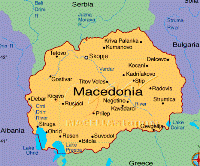The citizens of the Republic of Macedonia at the referendum held on 8 September 1991 expressed their will for the Republic of Macedonia to be constituted as a sovereign and independent state that was legally rounded up with the adoption of the Constitution on 17 November 1991.
According to the Constitution, the social-economic and political system of the Republic is based on the principle of rule of law, human rights and freedoms, division of power, market economy and the other fundamental values of a modern democratic society.
The Constitution constitutes the Constitutional Court of the Republic of Macedonia as a body that protects the constitutionality and legality as well as the fundamental human and citizens’ freedoms and rights.
The position, composition, competence and legal effect of the decisions of the Constitutional Court are specifically regulated with the Constitution of the Republic of Macedonia, while only the way of functioning and the proceedings before the Constitutional Court in compliance with the Constitution are regulated by the Court itself with its own act – Rules of Procedure of the Constitutional Court of the Republic of Macedonia, adopted on 7 October 1992.
The motive of the constitution-drafter for such a solution was to ensure autonomy and full independence of the Constitutional Court in regard to the Assembly and the other state bodies, and not self-regulating as we have been hearing recently.
Before introducing this special body, the representative i.e. legislative body was also the bearer of constitutionality, since it was believed that the drafter of laws also determined their constitutionality, which was a generally accepted model in the system of unity of power. The intention of the executive power, which has the majority in the Assembly and adopts laws expressly, is to ensure that they would not be assessed by the Constitutional Court, is an issue that Helsinki Committee for Human Rights, along with all ciitzens of the Republic of Maceodnia, seriously needs to work on.
The Helsinki Committee for Human Rights in Macedonia, in more than one occasions emphasised that for a state to be able to call itself a democratic and a rule of law state, it is not enough just to adopt a Constitution, but it is also necessary to ensure its application and control of its implementation. Only in that way the Constitution as the top legal act will get its significance and it will represent a barrier against obstinacy.
The Committee sincerely hopes that the President of the Government and the executive and legislative authorities will not act deaf to the numerous remarks, among which those by the representatives of the international factors that refer to the pressures of the Government exerted on the Constitutional Court and that in the future with their attitude they will contribute towards the respect of the independence of judiciary proving the maturity of our society.
”We sincerely hope that in the future a sense will develop and there will be a division between freedom of speech and hate speech contributing for the credibility of all institutions not to be the subject of the daily political sensations”, it is noted in the analysis.
The Committee also hopes that the Constitutional Court will remain consistent in performing its competences for the protection of constitutionality and legality regardless of the increasing pressures and qualifications for politically motivated decisions and party inclined actions.
Documents:
- HCHR in MK: Constitutional Court Analysis
Full analysis on the pressures on the Constitutional Court
Conducted by:






